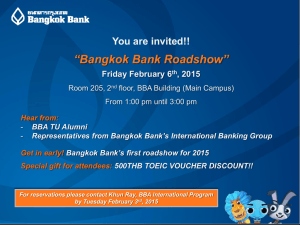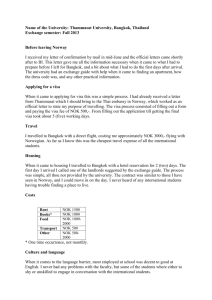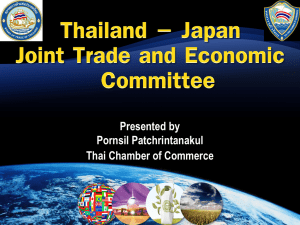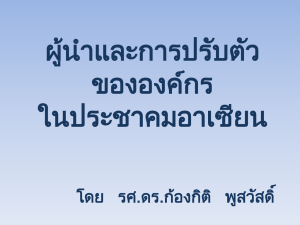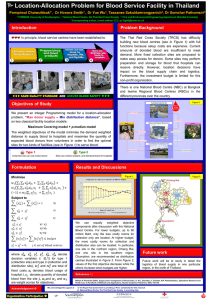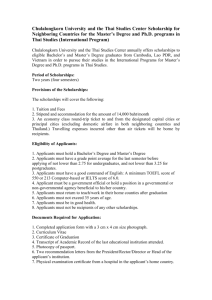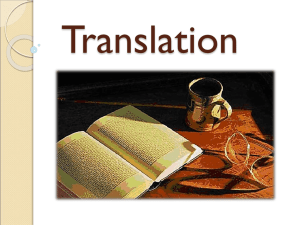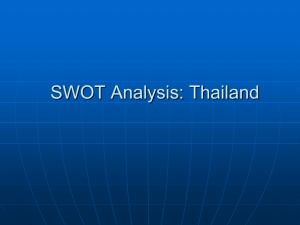Student report from Chulalongkorn – fall of 2009 – Bachelor
advertisement
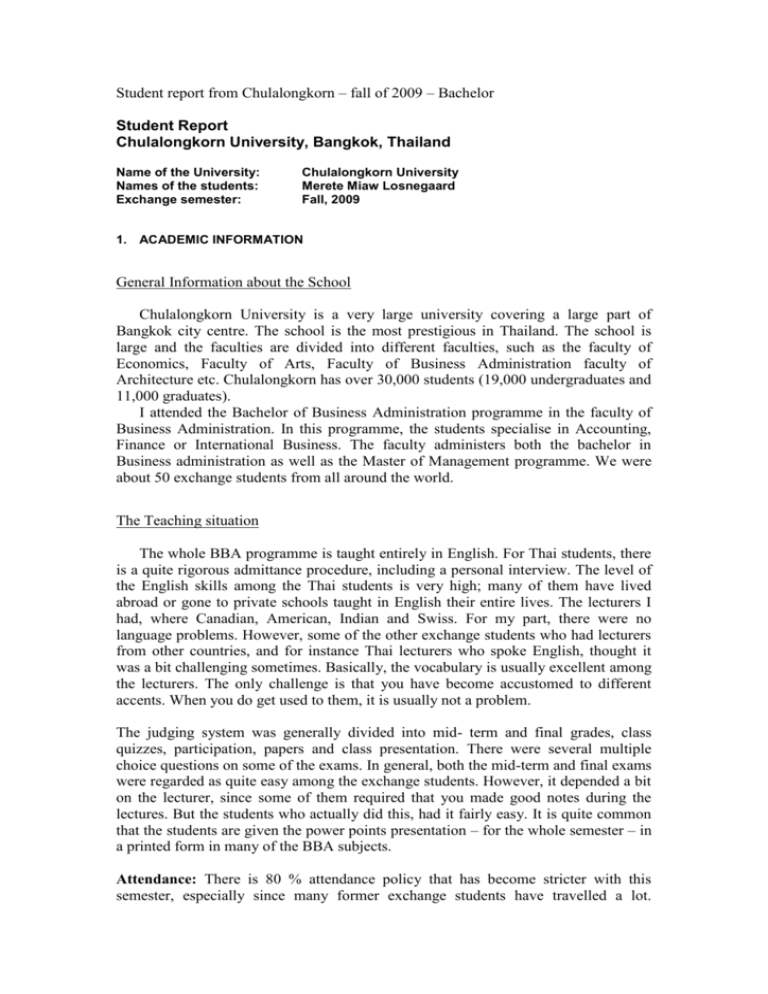
Student report from Chulalongkorn – fall of 2009 – Bachelor Student Report Chulalongkorn University, Bangkok, Thailand Name of the University: Names of the students: Exchange semester: Chulalongkorn University Merete Miaw Losnegaard Fall, 2009 1. ACADEMIC INFORMATION General Information about the School Chulalongkorn University is a very large university covering a large part of Bangkok city centre. The school is the most prestigious in Thailand. The school is large and the faculties are divided into different faculties, such as the faculty of Economics, Faculty of Arts, Faculty of Business Administration faculty of Architecture etc. Chulalongkorn has over 30,000 students (19,000 undergraduates and 11,000 graduates). I attended the Bachelor of Business Administration programme in the faculty of Business Administration. In this programme, the students specialise in Accounting, Finance or International Business. The faculty administers both the bachelor in Business administration as well as the Master of Management programme. We were about 50 exchange students from all around the world. The Teaching situation The whole BBA programme is taught entirely in English. For Thai students, there is a quite rigorous admittance procedure, including a personal interview. The level of the English skills among the Thai students is very high; many of them have lived abroad or gone to private schools taught in English their entire lives. The lecturers I had, where Canadian, American, Indian and Swiss. For my part, there were no language problems. However, some of the other exchange students who had lecturers from other countries, and for instance Thai lecturers who spoke English, thought it was a bit challenging sometimes. Basically, the vocabulary is usually excellent among the lecturers. The only challenge is that you have become accustomed to different accents. When you do get used to them, it is usually not a problem. The judging system was generally divided into mid- term and final grades, class quizzes, participation, papers and class presentation. There were several multiple choice questions on some of the exams. In general, both the mid-term and final exams were regarded as quite easy among the exchange students. However, it depended a bit on the lecturer, since some of them required that you made good notes during the lectures. But the students who actually did this, had it fairly easy. It is quite common that the students are given the power points presentation – for the whole semester – in a printed form in many of the BBA subjects. Attendance: There is 80 % attendance policy that has become stricter with this semester, especially since many former exchange students have travelled a lot. Basically, it meant that you could only be away for two lectures (i.e. two weeks) in every subject you take. However, not all of the lecturers enforce this rule strightly. Check with the other (Thai) students, or the lecturer him/herself to find out the policy. Class venues: There where often surprise changes in the class venues. This information was given by email only, so it could be hard to know sometimes, unless some other student knew about it too. The exam venues where never sent in an email. This was information the students had to find out by themselves – and was only posted on BBA's own website. There were therefore many exchange students who were not sure about the venue the evening before an exam. The best way to be sure, was to talk to a Thai student who was going to take the exam. They knew where to find the information. The Chula campus is big. Even though most of the lectures where held in the BBA buildings, it could be either on the other side of the campus (which took 15 minutes to walk, or you could take a campus bus) or it could be in the nearest shopping center. This could sometimes be confusing, since the regular venue could change in the middle of the semester. So the best way to have an overview of everything and how things worked was to ask some Thai students. Breaks: The lectures lasted for three hours, but without any scheduled breaks. Usually, the lecturer made a 20 minute break in the middle of the session. Many students made it a 30 minute break, and this was usually not a problem. Required Literature The literature is mostly standard business school curriculum. The exchange students are able to buy the books at the BBA administration. There is a faculty library with study areas, computer rooms for students and a main library/ study hall for Chulalongkorn. Information for the students was mostly given by email or on the teacher’s web page. Description of Courses 2605421 International Marketing (3rd year course): This subject gave a thorough perspective on international marketing, especially the importance of brands, and different strategies. This course gave had a global and Asian perspective on marketing. A basic course in Marketing was a prerequisite. There were two exams, two group projects that included both a presentation and a written report, plus score for class participation. 2602330 Human Resource Management(3rd year): This subject was a management course that gave introduction to the field of Human Resource Management. The grading was based on two exams and three papers. 2602371 Principles of International Business (3rd year): This was an introduction course to International Business This was a very interesting course that related to the implementation of business strategies, with real live case examples. Evaluation was on exams and class participation. 2602499 Seminar in International Business (4th year): Case based course that required preparation and participation from the students. The lecturer was a McKinsey Alumni, and emphasised the practice of analytical skills. Evaluation was based on, cases, presentations exams and class participation. 2. PRACTICAL INFORMATION ON THE SCHOOL AND THE EXCHANGE EXPERIENCE Information before arrival at Thailand/ Chulalongkorn 1. Information from the BBA office: The BBA office sends a lot of information before you leave Norway. They are very helpful if you have any problems. Just simply send an email. 2.Visa: You should buy the visa well in advance before leaving for Thailand. You get the visa (Non ed) at the Thai embassy in Oslo. A single entry visa costs 400 NOK. The BBA office will recommend that you buy a multiple entry visa if you plan to travel a bit. However, it is not possible to apply for this at the embassy in Oslo. This differs from country to country in Europe. An alternative for Norwegians citizens would therefore be to get it at the Immigration office in Bangkok. The single entry visa that you get does not last for the entire exchange period, so you still have to have to renew your visa. The BBA office will also help you with this when the times. 3.Courses: Begin early to search for relevant courses. Some courses that are the most relevant ones, might not be offered that specific semester, so it is important to have good alternatives. This will also make it easier to plan when arriving in Thailand, since you will know your weekly class schedule well in advance. Academic Calendar The academic semester began the 10th of August. The semester lasted until 14th December – the last day of the exam period. Most of the BBA exchange students were done with their exams around the 8th of December. There were two exam periods during the semester; the mid-terms were approximately end September/beginning October, final exam were at the end November/beginning of December. There were no longer breaks during the semester, except for the Thai holidays: Chulalongkorn day – 23th of October, The Kings birthday – 5th of December. Reception The BBA programme has many exchange students every semester. Before the semester begins, you will receive a lot of information, including about an information meeting the very first day of the semester. Expect things to be a bit more bureaucratic. There is a buddy programme for the exchange students. The buddy will help you with everything the first few weeks: here to buy the uniform, where to take pictures that meet the criteria, show you around campus, have lunch with you, and so forth. These are Thai BBA students, and have signed up for this voluntarily. In many cases, many of the buddies/exchange students kept in contact with each other, and the Thai became a social contact with the other Thai students. At the undergraduate level at Chulalongkorn, all the students are required to wear a uniform. The Thai students will help you to acquire a proper uniform, and what shoes and accessories are ok in the classes, the library and other places. (You could not wear open sandals if you went to the library, but it was fine when just attending a lecture). It might seem like a hassle, but in a very status conscious society, this shows that you are not another tourist when walking in the streets or in a shop, and it also shows that you are attending the most prestigious university in the country. Even taxi drivers will recognise the Chula-uniform. Housing At the beginning, I lived at guesthouse very centrally located. However, the alternatives suggested buy the BBA administration, might be best for several reasons. 95 % of the exchange students lived at Evergreen. Here, all of the students lived four in one apartment, sharing bedrooms two and two. The rent included house keeping, and then you paid an addition for electricity and internet access. Evergreen is located near the campus, and in a central area of town. Living here made it easy to be social with the other exhange students. The ones that had their own condo, lived at a place called Nonsi. This cost 20,000 baht, approximately 4000 NOK. The facilities themselves were nice, but a bit more out of central areas. Renting in the private market may be hard considering the language difficulties, but there may be good opportunities for good and inexpensive housing if you find a good deal. Most of the Asian exchange students rented privately. Costs The biggest cost is the rent. It is possible to find cheaper places farther from school, or live in fully serviced apartments more centrally located, like Evergreen, were most of the exchange students lived. Here, the rent was about 2000 NOK a month. Schoolbooks are sold through the BBA office. Books cost about 100 – 200 NOK. Food is cheap and you eat out every day. A meal in the school cantina costs about 6-7 NOK, and something to drink 1-5 NOK. Social Activities Contact with Thai students vary from exchange student to exchange student, and many find it a bit difficult to get to know Thai people. However, if you do make an effort, it is possible and rewarding. Thai people are very social. Going to get something to eat after a lecture, is a good way to connect. Thai students read for exam together at a café, not alone at home or in the library. It would also be good could to try to be updated on events that happen at school or perhaps join an activity like football or basketball practice. We were several exchange students that got Thai friends. Many exchange students spend a lot of time together; live, party and travel together. Travelling around Thailand and neighbouring countries is highly recommended. However, when it comes to cultural differences, it is important to remember that you do not only have to relate to the Thai culture, but all the different cultures that the exchange student represent too. Culture and Language The English skills among the BBA faculty and BBA students are very high. If you are in need of help somewhere in Bangkok, people will usually be able to help you, and if not, at least try as much as they can. In the big department stores and in tourist areas, people's English proficiency is ok. It is useful to learn a few phrases in Thai. If you are interested in languages, there are many language courses to attend in Bangkok. When travelling outside Bangkok, you will travel to places where people do not know any English. It is though, highly recommended to travel around the country and learn about the Thai culture, as it is very different from Norway and Europe in general, but very interesting. Cultural and Social Effects from the Exchange Experience Going to Thailand is going to a very different culture from Norway. Being an exchange student gives a better and different experience of Thailand and Bangkok in particular than tourists do. Having lectures at Chula gave a different perspective on the business world, and gave me an even greater desire to work aboard, especially in Asia. I also think that I would be more eligible to work in an international company in Norway. The experience has made it easier to understand different cultures, and increased understanding and need to adapt, be patient, accept differences and variety. It can be challenging sometimes too, but if you are open minded, you will see that this is also a part of the experience. Together with the fun, the new people you get and the new culture get to know, I highly recommend Thailand particular Chulalongkorn and Bangkok as a place to go on exchange! Feel free to contact me, if you have any questions. Name and e-mail: Merete Miaw Losnegaard: meretemiaw@hotmail.com
